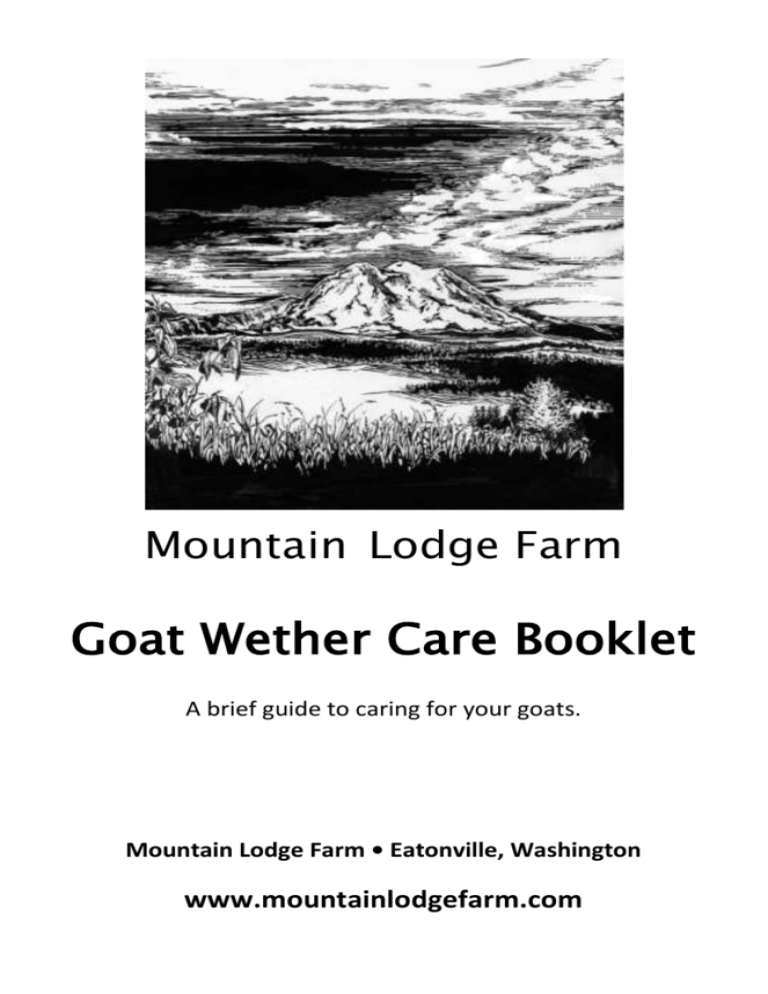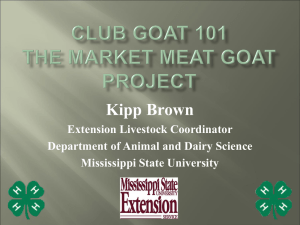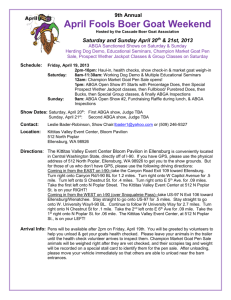wethercareguide2012 - Mountain Lodge Farm
advertisement

Mountain Lodge Farm Goat Wether Care Booklet A brief guide to caring for your goats. Mountain Lodge Farm • Eatonville, Washington www.mountainlodgefarm.com Names: Birthdays: Moms & Dads: Weaning dates: Banding dates: Your wether comes from a registered herd of Nigerian Dwarf and La Mancha goats. Our herd is CAE (Caprine Arthritis Encephalitis) & CL(Caseous Lymphadentis) free. Your wether has been given tetanus shots, has been disbudded (horns removed) and has been castrated (or will be castrated) with the banding method. Our goats have been bottle-fed and are very comfortable and friendly with their human caretakers. Normal Temperature: 101.5 - 104°F Heart Rate: 70-80 beats/minute Respiration: 12-15 breaths /minute Life span: Healthy wethers live 11-16 years @ 1-4 Weeks: Milk: 1oz per lb, 3 times a day** (we use 6 oz. whole cow’s milk mixed with 2 tbls. plain yogurt and 2 oz. cream for Nigerians). Hay: Grass hay to nibble on & access to a mineral supplement (we use a mix of SweetLix 16:8 Meat Maker, Dried Kelp & Diamond V XPC Yeast). Check your feed store for goat minerals. @ 4-7 Weeks: Milk: 8 – 12 oz., 2 times a day (mix same as above) Hay: Grass hay to nibble on and we add alfalfa hay & access to a mineral supplement. @ 7-8 Weeks: Milk: 8-12 oz., 1 time a day (no cream added) Hay: Grass and/or alfalfa hay to nibble, minerals & some choose to introduce ¼ to ½ cup rabbit pellets per day. Care: Your wether may begin to shed their horn scabs. They often look bloody, but they are a natural, painless part of that process. Spray with wound cleaner. The hair will grow back shortly. Weaning (anywhere from 8-12 weeks of age): Milk: 8-12oz., 1 time a day (no cream) for 1 – 2 weeks Encourage them to drink water by placing one of the bottle nipples in the water bucket and adding a little vinegar or electrolyte solution. 8 Weeks – 8 Months: Hay: Grass and/or alfalfa hay, optional ¼ to ½ cup rabbit pellets per day, minerals & introduce baking soda free choice. Care: Watch the site of your wether’s castration. As it dries up and is ready to fall off – you may need to apply wound spray or iodine in that area. This process can take up to 8 weeks. Deworming: We use an herbal dewormer from Molly’s Herbals at fiascofarm.com, but there are other non-herbal varieties out there – speak with your vet for a good one. Adulthood: Hay: Grass hay almost exclusively. Use caution with GRAIN OR ALFALFA (high in calcium & phosphorus which can cause urinary calculi). Start taking your goats out to browse – many vitamins and minerals can be found in the brush. Keep up the minerals & baking soda. Care: Trim hooves as needed (about every 2 months). Deworm as needed. Besides feeding your goats healthy rations and providing them clean drinking water and bedding, the best thing you can do to ensure the health of you animals is to pay close attention to them! Don’t change their feed quickly, and don’t overfeed them. Signs that something is wrong: Not interested in food and/or not ruminating Diarrhea Limping Crying out in pain Green or cloudy nasal discharge Straining to urinate Fiascofarm.com is a great resource for understanding what might be wrong with your goat. If you are not sure – call your vet. Basic first aid kit: Thermometer Wound spray or iodine Electrolyte replacement powder or fluid Hoof trimmers Probiotic paste (we give anytime goat has diarrhea or is stressed or hurt). Wether specific health concerns: Coccidiosis: Danger time: 4 wks. – 6 mos. This is a parasite found in the intestine. While normal in adult goats, it can be lethal in kids. It is spread by ingestion of feces. Symptoms: Diarrhea, listlessness & bloody stool. Treatment: Coccidiostats as directed by your vet. Plus probiotics and electrolytes if needed to replace fluids. Urinary Calculi: This can be a big problem in adult wethers but is easily preventable with the correct diet. Avoid foods high in calcium (alfalfa) and phosphorus (grain) after your wether is full size. Symptoms: Straining to urinate, frequent attempts to urinate, blood in urine. This is very painful for the goat and the only treatment available is a very expensive surgery – so best to avoid all together. An ounce of prevention… Owning a goat is a fantastic challenge that is worth every penny and drop of sweat. We are rewarded ten-fold for our time spent with them. A few last minute tips: Goats really don’t need much space to thrive – but they do need some shelter and fencing. They don’t enjoy the rain so keeping a roof over their heads and dry bedding is key. Goats should not be staked or tethered to anything. The risk for strangulation is too great. Goats, while easy to handle – can test your mettle. If you think they could possibly get into something or out of something – they will! Patience and goat-proofing go a long way. Because wethers do not expend energy on milking or breeding – they can quickly become overweight. Keep their weight down and your wether will keep healthy. Goats push or butt with their heads amongst themselves – but they shouldn’t do the same with you. Respond to this behavior with a firm “no.” If this is not enough – a squirt of water or firm tap on the nose should do it. Goats love to jump and play. An old stump or backyard children’s toy will provide huge fun for them. Online: fiascofarm.com : This is a great general goat reference. We also use Molly’s Herbals to treat our goats and you can find her products and advice here. pholiafarm.com : The Caldwells run a fantastic farm in Oregon. This site is rich with info specifically geared to Nigerian Dwarf owners. caprinesupply.com : Find all your goat related products here. thegoatstore.com : Hoegger Goat Supply - another great source for products. In Print: Belanger, Jerry. Storey’s Guide to Raising Dairy Goats. 2001. This is the classic. I’ve seen it on all goat owners’ shelves. All around good reference. Amundson, Carol A. How to Raise Goats. 2009. : This is a great book for kids and beginners of all ages. Lots of photos and a great goat overview. A big thank you to Gianaclis Caldwell at Pholia Farm! This booklet was greatly influenced by her Wether Care Guide.





